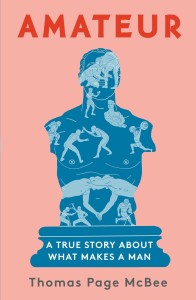Amateur
Thomas Page McBee
Scribner, 2018
Reviewed by Phillip Barcio
Amateur is the true story of a transgender man who enters a charity boxing match as part of his journey to discover the nature of masculinity. Over the course of his training, he confronts a series of uncomfortable epiphanies, such as the idea that masculinity might not exist, and that gender is a myth.
When first we meet Thomas Page McGee, he is exactly what the book’s title declares him to be: a beginner. Biologically, he is a newly-transitioned transgender man; romantically, he is in the early stages of his first long-term, committed relationship since transitioning; familially, he has just lost the only parent he ever really knew; and pugilisticly, he has no idea how to throw, absorb, avoid, or counter any kind of punch, physical or psychological.
Guiding us through his evolution into a “new man,” McBee is self-conscious and earnest. He shares his observations in an honest, confessional way, holding nothing back, whether admitting his own dark, fear-driven, violent thoughts when a drunk maniac threatens him on the streets, or describing the bewilderment he felt watching his mother die, or admiring the unexpected grace he conjured when confronting his sexually abusive step-father.
McGee also unabashedly admits he is an intellectual amateur: someone who has bought into the full contagion of ignorant assumptions that collectively make up contemporary American popular culture. Throughout his bruise-ridden journey towards Madison Square Garden, where he will face two opponents—another boxer and himself—his cognitive newbieism repeatedly asserts itself, particularly as he mistakes human characteristics, such as the will towards violence, the tendency to appear aloof, or the impulse to interrupt people, as “masculine” characteristics. He all-too-easily employs the phrase “toxic masculinity,” when what he is actually describing is toxic behavior of which all humans are capable. He asks, “Why do men fight?” when the real question is, “Why does the collaborative phenomenon of conflict sometimes manifest amongst biological organisms?”
Despite the immature irrationality of so many of his assumptions, I could not help rooting for McBee as he delved deeper into himself with each chapter—the sincerity with which he owns his own confusion is endearing.
As he gradually absorbs the lesson that the fighting arts are not about conquering outside opponents so much as they are about winning the battle within oneself, it also becomes increasingly clear to McGee that concepts such as manhood, womanhood, masculinity, femininity, gender, and sexuality, might be fictional constructs. Like race, nationality, creed, or any other social label humans have invented to diminish each other, the inherited biases that motivated the central struggle that sent him on this journey crumble under his own critical analyses.
But McGee also reminds us that things that are not real can still have real consequences—a hallucination can compel a schizophrenic to run into traffic and cause a tangible tragedy. Following McBee as he unmasks various cultural hallucinations as the false beliefs they are, we see that if we can change our thinking, we can change our destiny.
The subtitle of Amateur should be “A True Story About What Makes a Human,” rather than “A True Story About What Makes a Man.” However, McBee’s willingness to go down a frightening road of personal, emotional, psychological and physical growth, one which ends with two flawed but brave human animals pummeling each other before a crowd of thousands in the ring, is a compelling example of humanity at its best, one to which anyone with a heart and a mind will relate.


